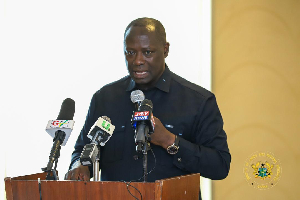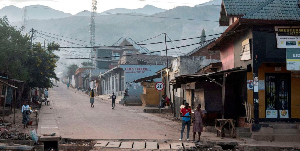By Kofi Akosah-Sarpong
As Ghana’s development process increasingly firm up, small towns are gradually paving the way for how to brighten the country’s progress against the backdrop of certain cultural values that have been inhibiting advancement.
First, the obscure remote rural Tain, in the Brong Ahafo region, effectively decided the final outcome of the 2008 presidential elections that saw Dr. John Atta Mills elected as president. Tain revealed the growing democratic space across Ghana. Now, Bongo, in the Upper East region, is tackling the vexing issue of witchcraft head-on that has been entangling many a Ghanaians progress for centuries.
Bongo may be diminutive but it is rolling a giant significant enlightenment dice for its progress. Clement Abugri Tia, Bongo’s audacious District Chief Executive, charged that there is “no scientific evidence” to support the ancient belief in witchcraft as the cause of death, accidents and other misfortune that has seen the accusers terrorized, harassed, threatened, killed, banished, or physically assaulted.
Tia says witchcraft accusations will be met with “arrest and prosecution” – against the backdrop of human rights and the material proof of the accuser responsible for the alleged misfortunes. The Bongo pattern exists throughout superstitious Ghana. In Bongo, the scientific side of the witchcraft accuser’s mind, formed by the culture, demands objective evidence, but the brain's mythopoeic, superstition-thinking side is enticed to witchcraft as the cause of misfortunes, deaths, or failure in life. In Bongo, the scientific side of the mind cannot be reconciled with the superstitious side. In Bongo, however, the scientific side of the mind can address these matters of the whole mind.
Witchcraft in 2009, in the full throttle of Ghana’s progress? Bongo rejects the possibility and asks for justification. In Bongo, witchcraft and progress are incompatible – societies do not progress with witchcraft mindset. Where the development process is heavily mired in witchcraft beliefs it weakens the intellectualization of the development process. By attempting to intellectualize this aspect of its cultural values, Bongo is helping its citizens to think well, to reason, to free them from centuries of mental slavery and fear, and to move the deadly witchcraft beliefs to the intellectual framework, to the human agency for refinement.
Ghana’s booming democracy is offering elaborate answers to witchcraft beliefs where the rule of law, freedoms and human rights are attempting to refine certain inhibitions within the culture. DCE Tia, reported the Accra-based The Ghanaian Chronicle, argued that witchcraft “cannot also be supported by any law, therefore, people cannot use it to violate the rights of others, by subjecting them to all forms of physical assaults, or in some cases killing them because they claim these persons are witches.”
Why are Bongo and Ghanaians frightful of witchcraft and give it immense powers to darken a clear sense of life’s progress? The crucial answer is obvious – certain parts of the culture, in the face of development challenges, where there haven’t been scientific explanation as to whether, really, witchcraft is responsible for deaths, vehicular accidents, diseases, poverty, and other misfortunes.
Witchcraft speculation blocks the mind from reasoning and usually ends by deviously demeaning the human place in human advancement. The eerie image of a one-month-old baby called Mercy accused of being a witch and afterwards abandoned to die in Upper East region reveals society’s inability to critically comprehend itself and evolve. In baby Mercy, the mind constricts, and we imagine ourselves as entrapped in some sort of witchcraft solitary confinement, and being manipulated helplessly like puppets by alleged witches such as Mercy to cause crisis, to become an alcoholic, to murder, to get sick, or to cause crimes without us being responsible for our actions.
Such witchcraft abyss (with all its imagined scary images of witches using human flesh to prepare food and drinking human blood and plotting diabolical schemes to destroy the innocent) consumes even some educated people (in the Western sense), even some scientists, who have not extricated their minds from witchcraft beliefs. A prominent Ghanaian “Big Man” once told me that on a visit to see a sick relative at Ghana’s premier Korle Bu Teaching Hospital, in Accra, a medical doctor who was doing the rounds in the ward told some patients, “You shouldn’t be bringing your witchcrafts caused diseases here.”
If a medical doctor, who is supposed to be a scientist, thinks and talks like this, especially in front of sick patients, then the whole Ghanaian development system has a big problem, and Bongo’s anti-witchcraft enlightenment campaign becomes a meaning to the whole Ghana. Once again, in the face of Bongo’s enlightened universe, the medical doctor’s witchcraft-thinking may be substantially more depressing than the assumption of human weakness in the face of divine distinctiveness and the importance of the human enterprise.
In Bongo, Ghana is developing, not necessarily in bread-and-butter sense, but in values, seeing Ghana, as an organism, growing.
By employing a mixture of scientific thinking and the tenets of Ghana’s democratic values – the rule of law, human rights, freedoms – to thinking beyond the limits placed by witchcraft on their minds that has let the magic-thinking part of the brain outweigh the scientific part in dealing with everyday life’s challenges, Bongo is telling Ghanaians that for Ghana to see a holistic progress it has to subdue its own self-destructive beliefs in witchcraft and move on in self-transcendence.
Despite its unassuming nature, Bongo’s momentous enlightenment in tackling the primordial witchcraft menace might mark a higher stage in Ghana’s progress, and a clear liberation. Until other more serious witchcraft troubled Ghanaian societies go the Bongo way, then, for the meantime, it will go on raining witches causing accidents and diseases and deaths upon Ghanaians’ minds.
Opinions of Tuesday, 23 June 2009
Columnist: Akosah-Sarpong, Kofi














